Have you ever felt like life keeps knocking you down?
In Japan, there's a powerful saying that reminds us to never give up: "七転び八起き (Nanakorobi yaoki)"—which means “Fall down seven times, stand up eight.” It’s a simple phrase, but it speaks volumes about resilience and perseverance, core values deeply rooted in Japanese culture.
Japanese quotes and proverbs like this one aren’t just catchy sayings—they reflect centuries of wisdom passed down through generations. These expressions reveal deep truths and offer timeless life lessons that continue to resonate today.
In this article, we’ll explore some of the most famous Japanese quotes, what they mean, and how they reflect the heart and soul of Japanese culture. Whether you’re looking for daily inspiration or trying to connect more deeply with the Japanese language and mindset, or simply understand japanese anime phrases , these sayings will give you a fresh and meaningful perspective.
How to use ChatGPT to Study Japanese (with Promps)
12 Japanese Anime for Kids That Will Make You Master Japanese
Japanglish: 26+ Japanese English Words You Can Easily Learn

Famous Japanese Quotes and Their Meanings
Historical Quotes
Japanese history is rich with wisdom from samurai, poets, and philosophers. Here are some notable examples:
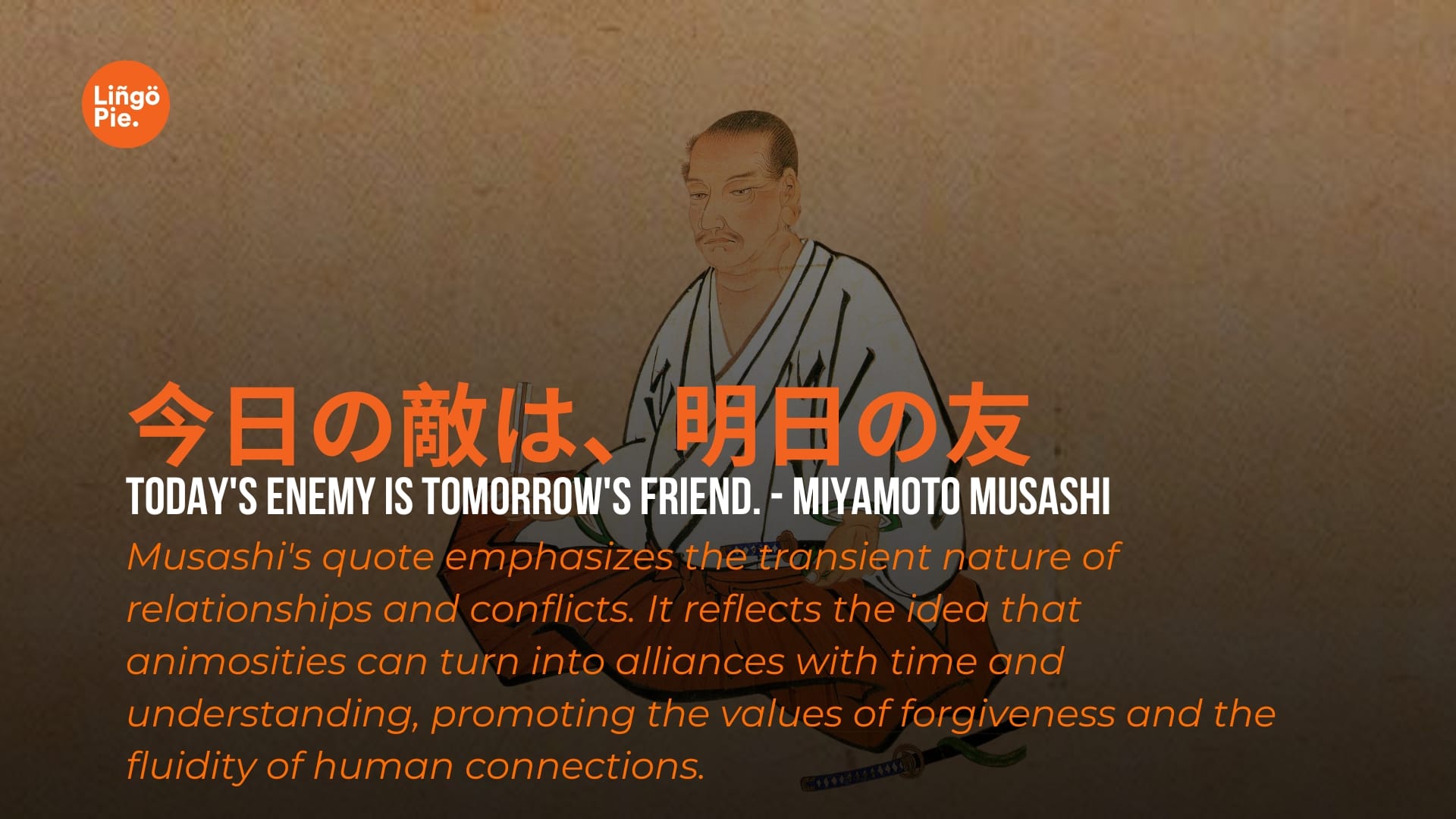
Quote #1: "今日の敵は、明日の友" (Kyō no teki wa, ashita no tomo) "Today's enemy is tomorrow's friend."
- Miyamoto Musashi
Explanation: Musashi's quote emphasizes the transient nature of relationships and conflicts. It reflects the idea that animosities can turn into alliances with time and understanding, promoting the values of forgiveness and the fluidity of human connections.
Quote #2: "己を知れ" (Onore o shire) "Know yourself."
- Yamamoto Tsunetomo
Explanation: This quote from Yamamoto Tsunetomo, author of "Hagakure," highlights the importance of self-awareness. Understanding one's strengths and weaknesses is essential for personal growth and wisdom, a core principle in samurai philosophy.
Quote #3: "花より団子" (Hana yori dango) "Dumplings over flowers."
Explanation: This proverb suggests valuing practicality over aesthetics. Originating from the samurai era, it reminds people to prioritize substance and utility over mere appearances.
Anime Quotes
Contemporary Japanese culture, including anime and manga, offers memorable quotes that resonate with modern audiences:
Quote #4: "努力は裏切らない" (Doryoku wa uragiranai) "Effort never betrays you."
- "Naruto"
Explanation: This quote underscores the importance of perseverance and hard work, resonating with the anime's themes of determination and personal growth. It encourages individuals to keep striving towards their goals, reinforcing the belief that persistence will eventually lead to success.

Quote #5: "未来を変えるのは、いつだって自分だ。" (Mirai o kaeru no wa, itsu datte jibun da.) "The one who can change the future, is always yourself."
- "One Piece"
Explanation: This quote from the popular anime "One Piece" empowers individuals to take control of their destinies. It emphasizes personal responsibility and the power of self-determination in shaping one’s future.
Quote #6: "自分を信じて、仲間を信じて。" (Jibun o shinjite, nakama o shinjite.) "Believe in yourself, believe in your friends."
- "Fairy Tail"
Explanation: This quote highlights the importance of self-confidence and trust in others. It encourages a sense of community and mutual support, essential themes in the series "Fairy Tail."

Japanese Proverbs
Japanese proverbs (ことわざ, kotowaza) encapsulate timeless wisdom in a few words. Here are some examples:
Quote #7: "七転び八起き" (Nanakorobi yaoki) "Fall down seven times, stand up eight."
Explanation: This proverb teaches resilience and persistence. It conveys the message that no matter how many times you face setbacks, it's crucial to keep getting back up and trying again. It's a powerful reminder of the strength of the human spirit and the importance of perseverance in overcoming challenges.
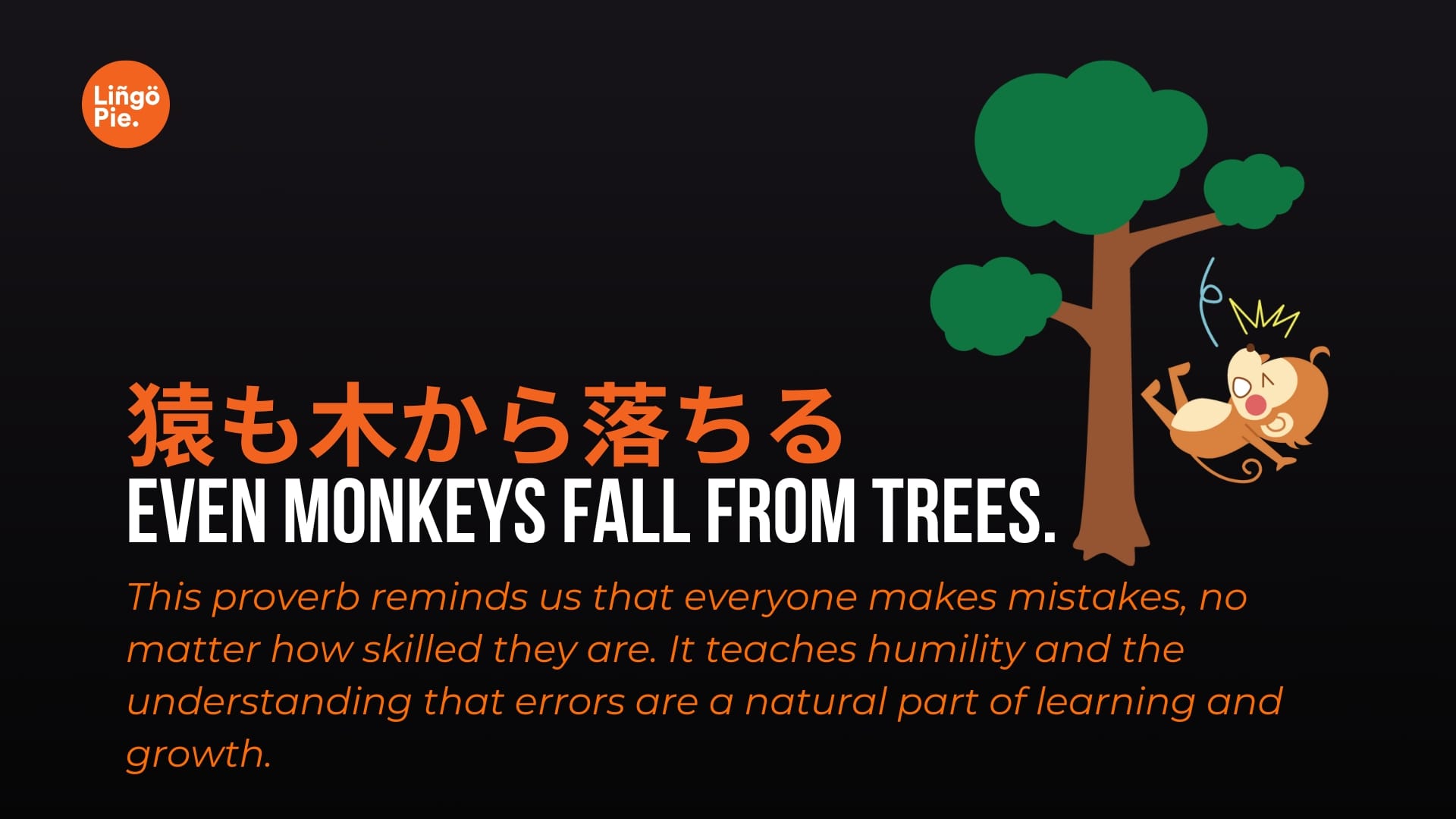
Quote #8: "猿も木から落ちる" (Saru mo ki kara ochiru) "Even monkeys fall from trees."
Explanation: This proverb reminds us that everyone makes mistakes, no matter how skilled they are. It teaches humility and the understanding that errors are a natural part of learning and growth.
Quote #9: "石の上にも三年" (Ishi no ue ni mo sannen) "Three years on a stone."
Explanation: This proverb emphasizes the value of patience and perseverance. It suggests that even sitting on a cold stone will warm it after three years, meaning that consistent effort and endurance will eventually yield positive results.
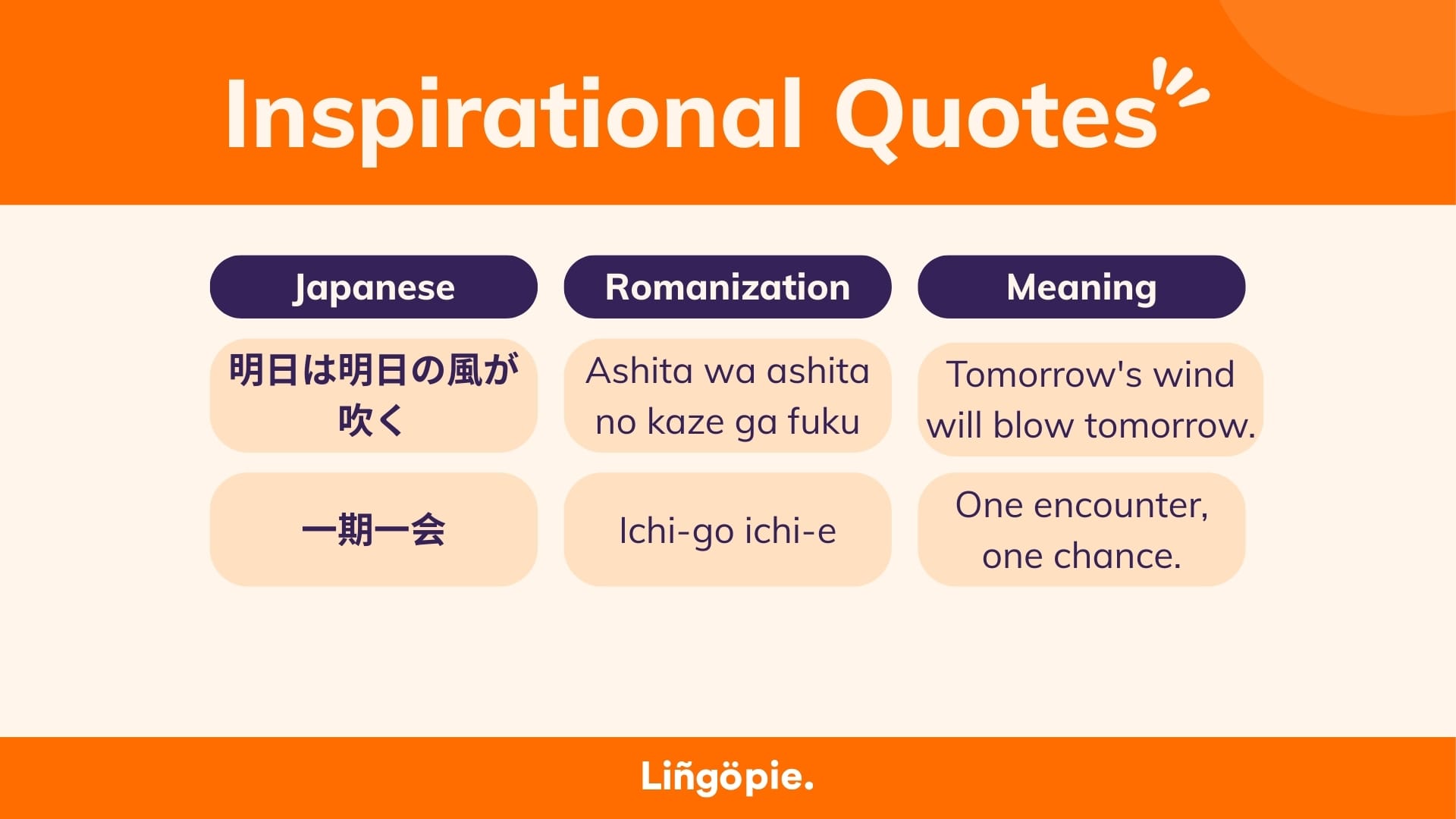
Inspirational Quotes
Inspirational quotes are designed to uplift and motivate, providing encouragement in challenging times.
Quote #10: "明日は明日の風が吹く" (Ashita wa ashita no kaze ga fuku)
"Tomorrow's wind will blow tomorrow."
Explanation: This quote encourages people to live in the present and not worry excessively about the future. It suggests that each day brings new opportunities and solutions, reminding us to stay hopeful and positive.
Quote #11: "不可能を可能にするのは努力だ" (Fukanō o kanō ni suru no wa doryoku da)
"It is effort that makes the impossible possible."
Explanation: This quote emphasizes the power of hard work and determination. It motivates individuals to push beyond their limits and strive for their goals, reinforcing the belief that effort can overcome obstacles.
Quote #12: "一期一会" (Ichi-go ichi-e)
"One encounter, one chance."
Explanation: This proverb reminds us to cherish each moment and each encounter in life, as they are unique and fleeting. It encourages mindfulness and appreciation for the present.
Wisdom Quotes
Wisdom quotes offer deep insights into life, providing valuable lessons and reflections.
Quote #13: "知恵は石の上にも三年" (Chie wa ishi no ue ni mo sannen)
"Wisdom comes even to a stone after three years."
Explanation: This proverb teaches patience and persistence in acquiring wisdom. It suggests that continuous effort and experience lead to deeper understanding and insight over time.
Quote #14: "虎穴に入らずんば虎子を得ず" (Koketsu ni irazunba koji o ezu)
"Without entering the tiger's den, you cannot get the tiger's cub."
Explanation: This quote advises courage and determination in pursuing goals. It implies that risks are necessary to achieve significant rewards, encouraging individuals to face challenges bravely.
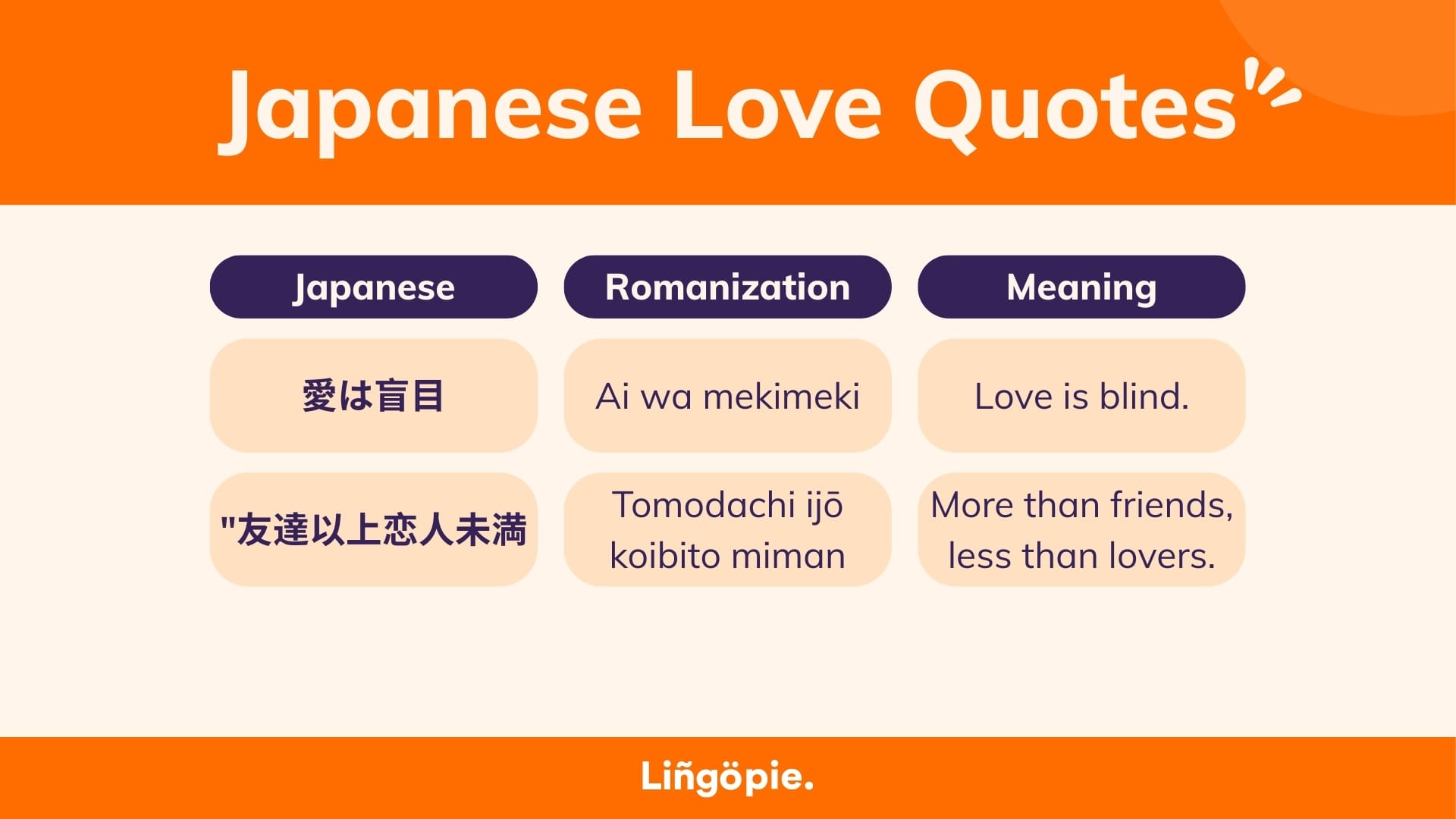
Love and Relationships Quotes
These quotes focus on the themes of love, friendship, and human connections.
Quote #15: "愛は盲目" (Ai wa mekimeki)
"Love is blind."
Explanation: This phrase suggests that love overlooks faults and imperfections, emphasizing the depth of emotional connection and acceptance in relationships.
Quote #16: "友達以上恋人未満" (Tomodachi ijō koibito miman)
"More than friends, less than lovers."
Explanation: This quote explores the delicate balance between friendship and romantic love. It reflects on the complexities and nuances of relationships that may evolve over time.
Nature and Simplicity Quotes
Quotes in this category reflect a deep appreciation for nature and the beauty of simplicity.
Quote #17: "木漏れ日" (Komorebi)
"Sunlight filtering through leaves."
Explanation: This word captures the serene beauty of sunlight filtering through trees, evoking a sense of peace and tranquility in nature.
Quote #18: "物の哀れ" (Mono no aware)
"The pathos of things."
Explanation: This phrase conveys a deep sensitivity to the impermanence and transient beauty of life and nature, emphasizing the appreciation of fleeting moments and emotions.
Read Also:

How To Learn Japanese Through Quotes?
Language Learning
Japanese quotes are an excellent resource to learn Japanese. By studying quotes, you can:
Enhance Vocabulary: Quotes often use a variety of vocabulary, including idiomatic expressions and less common words. This exposure helps expand your word bank.
Improve Grammar: Analyzing the structure of quotes helps understand Japanese grammar in context. Seeing how particles, verb forms, and sentence structures are used in meaningful sentences can reinforce your learning.
Practice Pronunciation: Reading quotes aloud can improve your pronunciation and fluency. It’s a great way to practice intonation and rhythm.
For instance, the quote "七転び八起き" (Nanakorobi yaoki - "Fall down seven times, stand up eight") not only teaches the word for "fall" (転び, korobi) and "stand up" (起き, oki), but also reinforces counting and perseverance as a cultural value.
Cultural Understanding
Quotes provide a window into Japanese culture, philosophy, and values:
Philosophical Insights: Many quotes are rooted in Zen Buddhism, Shinto beliefs, or the samurai code of Bushido. Understanding these quotes can give you a deeper appreciation of Japanese thought and spirituality.
Historical Context: Quotes from historical figures like samurai or poets reflect the times they lived in and the values they upheld. Learning about these quotes can enrich your knowledge of Japanese history and social norms.
Everyday Life: Proverbs and sayings often reflect common wisdom and practices. For example, "花鳥風月" (Kachōfūgetsu - "Flower, bird, wind, moon") emphasizes the importance of nature in daily life.
Practical Tips
Here are some resources and methods for finding and practicing Japanese quotes:
Books: Look for books that focus on Japanese proverbs, idioms, and sayings. Titles like "Japanese Proverbs and Sayings" by Daniel Crump Buchanan offer a great starting point.
Websites and Apps: Websites like Tofugu and apps like Memrise or Anki can be useful for finding and memorizing quotes. They often provide context and usage examples.
Flashcards: Create flashcards with quotes on one side and their meanings and explanations on the other. This method is particularly effective for memorization and review.
Language Exchange: Engage with native Japanese speakers through language exchange platforms. Discussing quotes can be a great conversation starter and a way to gain insights into their meanings and cultural significance.
Calligraphy Classes: Take a calligraphy class to learn how to write quotes beautifully. This practice not only improves your writing skills but also deepens your connection to the language and its artistic traditions.
Final Words
Japanese quotes offer more than just words—they provide deep insights into Japan's culture and values. From ancient wisdom shared by samurai to modern anime sayings, these quotes teach us about resilience, simplicity, and the importance of understanding oneself and others. Exploring these quotes not only helps us learn Japanese but also gives us a glimpse into the heart of Japan itself, where every phrase carries a story and a lesson about life.
Frequently Asked Questions
What is a famous Japanese quote?
One of the most famous Japanese quotes is 「七転び八起き」(Nanakorobi yaoki), which means “Fall down seven times, stand up eight.” It’s a powerful reminder to persevere through challenges and never give up, no matter how many times life knocks you down.
What is the Japanese strength quote?
A well-known Japanese quote about strength is 「雨降って地固まる」(Ame futte ji katamaru) – “After the rain, the ground hardens.” It means that adversity makes you stronger, and hardships often lead to personal growth and resilience.
What is the most popular Japanese phrase?
One of the most widely used and recognized Japanese phrases is 「いただきます」(Itadakimasu), said before eating. It expresses gratitude for the meal and the effort behind it. It reflects the deeply ingrained values of respect and humility in Japanese culture.
What is the best quote for success in Japanese?
「継続は力なり」(Keizoku wa chikara nari) translates to “Continuance is power.” It emphasizes that steady effort and consistency are the keys to success—an idea that resonates strongly in both everyday life and professional growth.
What is the Japanese humble quote?
A beautiful quote that captures the spirit of humility is 「実るほど頭を垂れる稲穂かな」(Minoru hodo koube wo tareru inaho kana) – “The boughs that bear the most hang the lowest.” It means that truly wise or accomplished people are often the most humble.
Learn Real Japanese Through TV Shows With Lingopie!

Ready to learn Japanese in a fun and relaxed way? Lingopie's got you covered! Dive into a world of Japanese TV shows, movies, and anime, handpicked to help you learn the language naturally.
With Lingopie's easy-to-use platform, you can enjoy your favorite entertainment while picking up new words and phrases. Whether you're into dramas like "Terrace House," classic films like "Spirited Away," or popular anime series like "My Hero Academia," Lingopie has something for everyone. Start learning Japanese today with Lingopie and have fun while doing it!
Download Lingopie from the App Store or Play Store now and get a FREE 7-day trial!


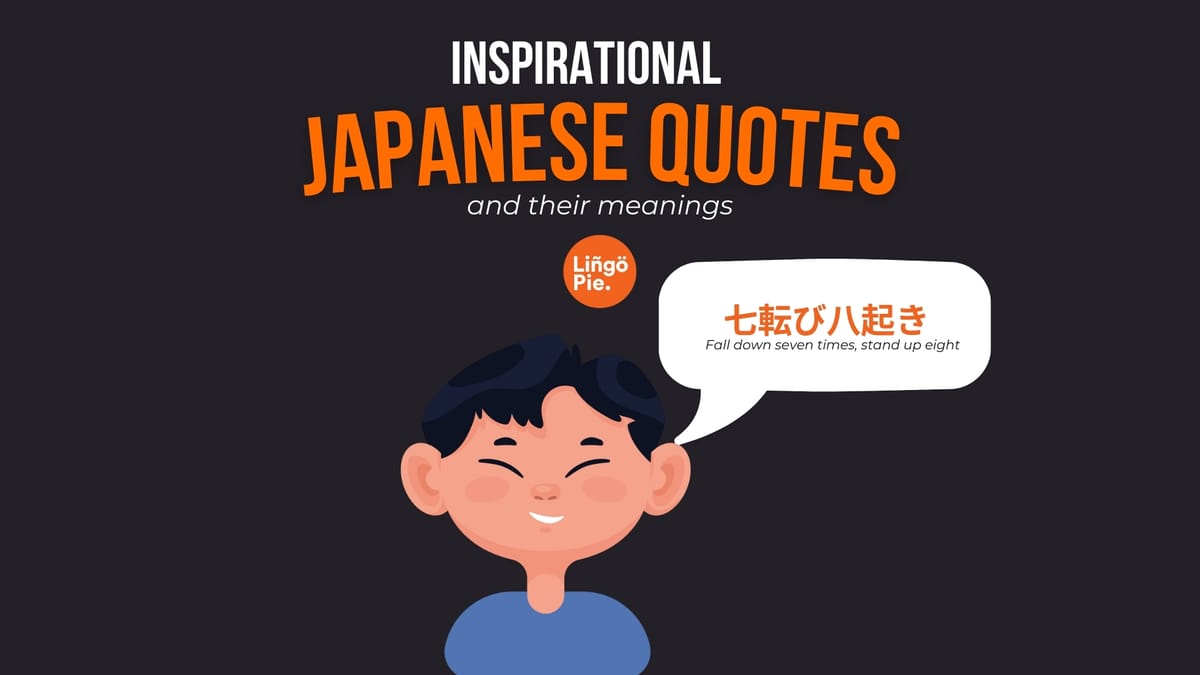





![12 Best Japanese TV Shows To Learn Japanese [2026]](/blog/content/images/size/w300/2023/09/C-pia-de-imgs-blog---Spanish-1--10-.png)
![How To Write The Japanese Kanji For Love [+ FREE Printable]](/blog/content/images/size/w300/2025/03/Japanese-Kanji-for-Love-1.jpg)
